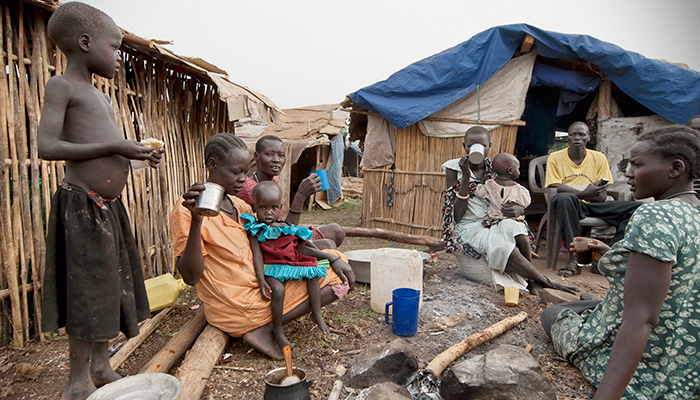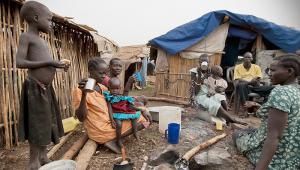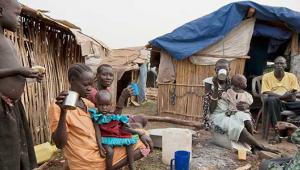South-Sudan-shutterstock_326255036.jpg

People in a refugee camp in Juba, South Sudan.
Three United Nations agencies made the announcement today, the first such declaration since 2011, following a string of warnings from NGOs that urgent action is needed to avert famine across the east of the continent in particular. Conflict-hit countries such as South Sudan and Yemen are among the most at risk.
In South Sudan, three years of conflict have forced many from their homes and decimated crops and rural livelihoods. Meanwhile, soaring inflation (up to 800% year-on-year) and market failure have left both urban and rural populations unable to afford the massive price increases on basic food stuffs.
Joyce Luma, South Sudan country director for the World Food Programme, which was one of the agencies to announce the famine, described the situation in the world’s youngest country as “man made”.
“WFP and the entire humanitarian community have been trying with all our might to avoid this catastrophe, mounting a humanitarian response of a scale that quite frankly would have seemed impossible three years ago,” she said.
“But we have also warned that there is only so much that humanitarian assistance can achieve in the absence of meaningful peace and security.”
The famine is centred in South Sudan’s Unity State, in the country’s north, which has been heavily affected by the fighting.
According to the latest classification by the world’s tool for analysing food security, the Integrated Food security Phase Classification (IPC), two counties in the state – Leer and Mayendit – are expected to experience famine until July 2017.
That means that, even with humanitarian aid, at least one in five households in the area are suffering from an extreme lack of food and the impacts of this – severe hunger, destitution and death – are already evident.
One other county – Koch – is classified as at high risk, while Panyijiar will remain in a food emergency, but the situation should not degrade further if humanitarian aid is delivered as planned.
Around 100,000 people now face starvation, and a further one million are on the brink of famine.
Across the entire country, the number of people that are severely food insecure is expected to rise to 5.5 million (47% of the population) by July – an unprecedented level marking a major public health emergency, the IPC said.
It said there is a narrow window of opportunity to deliver and organise assistance before what is known as the lean season – when factors such as lack of rain or cold weather, mean families have to turn to food aid to survive – peaks in July.
Otherwise, the IPC warned, food insecurity could increase drastically.
Serge Tissot, the representative of the Food and Agriculture Organisation in South Sudan, said aid agencies’ “worst fears” had been realised.
“Famine has become a tragic reality in South Sudan... Many families have exhausted every means they have to survive,” he said.
“The people are predominantly farmers and war has disrupted agriculture. They’ve lost their livestock, even their farming tools. For months there has been a total reliance on whatever plants they can find and fish they can catch.”
UN agencies called for aid to South Sudan to be scaled up, and for this to be delivered unimpeded by the conflict.
Jeremy Hopkins, UNICEF representative in South Sudan, said: “We urge all parties to allow humanitarian organisations unrestricted access to the affected populations, so we can assist the most vulnerable and prevent yet another humanitarian catastrophe.”












